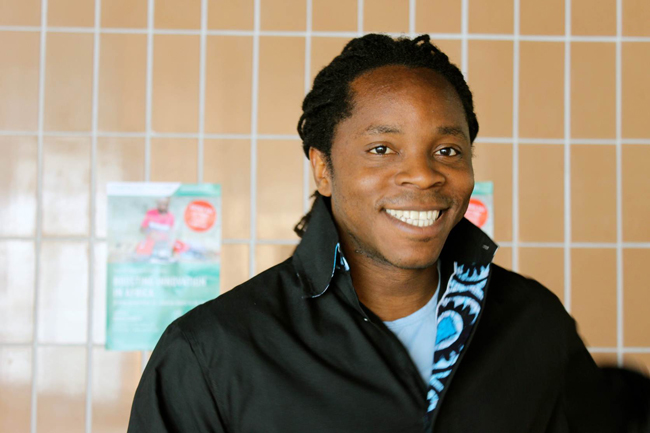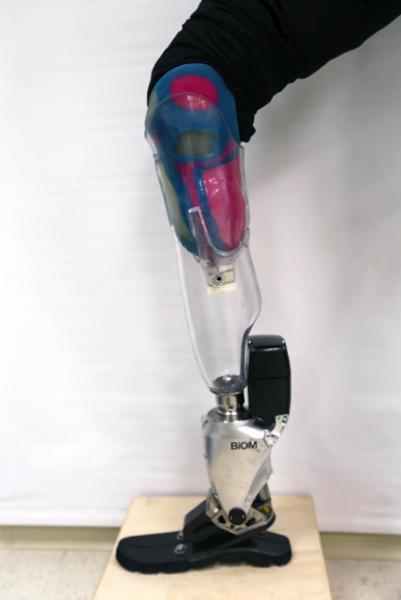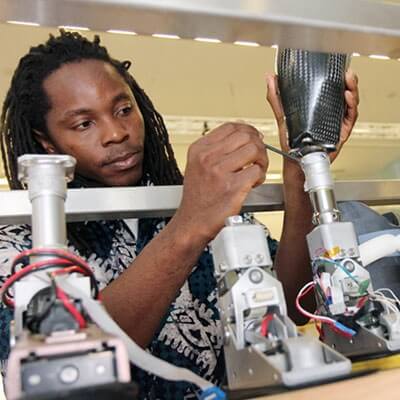News
David Sengeh is a 2010 graduate of Harvard College, where he studied biomedical engineering. (Photo courtesy of the Lemelson-MIT Program.)

David Sengeh studied biomedical engineering at Harvard SEAS. (Photo courtesy of the Lemelson-MIT Program.)
Cambridge, Mass. – April 9, 2014 – Harvard College graduate David Sengeh ’10, whose research brings new comfort to amputees using prosthetic devices, today received the 2014 Lemelson-MIT National Collegiate Student Prize for his innovative and promising contributions to improving health care.
 Sengeh studied biomedical engineering at the Harvard School of Engineering and Applied Sciences (SEAS) and is now a doctoral student at the Massachusetts Institute of Technology (MIT), investigating biomechatronics at the MIT Media Lab.
Sengeh studied biomedical engineering at the Harvard School of Engineering and Applied Sciences (SEAS) and is now a doctoral student at the Massachusetts Institute of Technology (MIT), investigating biomechatronics at the MIT Media Lab.
In his research, Sengeh uses surface scanning, magnetic resonance imaging, computer-aided design, and 3D printing to create individually customized sockets for prostheses that reduce the amount of uncomfortable pressure on the wearer’s body. The prototypes have been tested by veterans and other patients, including amputees from the Boston Marathon bombings.
The $15,000 “Cure It!” prize is awarded on the basis of “breadth and depth of inventiveness and creativity; potential for societal benefit and economic commercial success; and experience and ability to serve as a role model for youth.”
As an undergraduate at Harvard, Sengeh founded a non-profit called Global Minimum and spent his college summers traveling hundreds of miles on foot to distribute mosquito nets to prevent malaria in his home country, Sierra Leone. He also worked with David A. Edwards, Gordon McKay Professor of the Practice of Idea Translation at Harvard SEAS, on a project that was awarded $200,000 by the World Bank to create microbial fuel cells—essentially, dirt-powered generators—that would bring electricity to rural parts of sub-Saharan Africa.
Sengeh’s current scientific interests were ultimately shaped by the aftermath of the civil war in Sierra Leone, as he explains in this CNN video.
“Seeing people who had lost their limbs and whose lives were just kind of cut short was very, very traumatizing, but then it also opened this desire to engineer a solution,” he told CNN.
Through non-profit work and his research in the lab, Sengeh is now an advocate of technological development and youth empowerment in developing nations.
Joshua Schuler, executive director of the Lemelson-MIT Program, said, “This competition celebrates students who are translating research discoveries into ground breaking inventions, and fostering creative and inventive thinking among youth. This year’s winners are at the forefront of technological invention in healthcare and consumer products.”
Previous winners of the Lemelson-MIT student prize have included Alice Chen, Ph.D. ’11, and Erez Lieberman Aiden, Ph.D. ’09.
ABOUT THE LEMELSON FOUNDATION
The Lemelson Foundation uses the power of invention to improve lives, by inspiring and enabling the next generation of inventors and invention based enterprises to promote economic growth in the US and social and economic progress for the poor in developing countries. Established by prolific US inventor Jerome Lemelson and his wife Dorothy in 1992, to date the Foundation has provided or committed more than $175 million in grants and PRIs in support of its mission. For more information, visit http://lemelson.org.
Adapted from an original release by the Lemelson-MIT Program.
Topics: Health / Medicine, Bioengineering
Cutting-edge science delivered direct to your inbox.
Join the Harvard SEAS mailing list.



